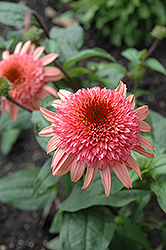Cone-fections™ Raspberry Truffle Coneflower
Echinacea purpurea 'Raspberry Truffle'
Plant Height: 18 inches
Flower Height: 24 inches
Spread: 30 inches
Sunlight:
![]()
Hardiness Zone: 4a
Group/Class: Cone-fections Series
Brand: Plants Nouveau
Description:
Huge, attractive raspberry-pink flowers that are rounded and fully double, held up on thick dark red stems; great for flower arrangements, attracts pollinators and feeds the birds in winter; use in naturalized areas
Ornamental Features
Cone-fections™ Raspberry Truffle Coneflower features showy lightly-scented double violet daisy flowers with pink overtones at the ends of the stems from mid summer to mid fall. The flowers are excellent for cutting. Its pointy leaves remain green in colour throughout the season.
Landscape Attributes
Cone-fections™ Raspberry Truffle Coneflower is an herbaceous perennial with an upright spreading habit of growth. Its medium texture blends into the garden, but can always be balanced by a couple of finer or coarser plants for an effective composition.
This is a relatively low maintenance plant, and is best cleaned up in early spring before it resumes active growth for the season. It is a good choice for attracting butterflies to your yard, but is not particularly attractive to deer who tend to leave it alone in favor of tastier treats. It has no significant negative characteristics.
Cone-fections™ Raspberry Truffle Coneflower is recommended for the following landscape applications;
- Mass Planting
- Border Edging
- General Garden Use
- Container Planting
Planting & Growing
Cone-fections™ Raspberry Truffle Coneflower will grow to be about 18 inches tall at maturity extending to 24 inches tall with the flowers, with a spread of 30 inches. Its foliage tends to remain dense right to the ground, not requiring facer plants in front. It grows at a medium rate, and under ideal conditions can be expected to live for approximately 10 years. As an herbaceous perennial, this plant will usually die back to the crown each winter, and will regrow from the base each spring. Be careful not to disturb the crown in late winter when it may not be readily seen!
This plant should only be grown in full sunlight. It is very adaptable to both dry and moist locations, and should do just fine under typical garden conditions. It is considered to be drought-tolerant, and thus makes an ideal choice for a low-water garden or xeriscape application. It is not particular as to soil type or pH. It is highly tolerant of urban pollution and will even thrive in inner city environments. This is a selection of a native North American species. It can be propagated by division; however, as a cultivated variety, be aware that it may be subject to certain restrictions or prohibitions on propagation.
Cone-fections™ Raspberry Truffle Coneflower is a fine choice for the garden, but it is also a good selection for planting in outdoor pots and containers. With its upright habit of growth, it is best suited for use as a 'thriller' in the 'spiller-thriller-filler' container combination; plant it near the center of the pot, surrounded by smaller plants and those that spill over the edges. Note that when growing plants in outdoor containers and baskets, they may require more frequent waterings than they would in the yard or garden.
Disclaimer - This resource is provided for informational purposes only and does NOT reflect current availability. Inventory varies seasonally, so we cannot guarantee that every plant will be in stock at all times - please contact your favourite GardenWorks location directly for current availability. It does not include our entire inventory of plants, so be sure to visit GardenWorks to see varieties that may not be represented on this list.

